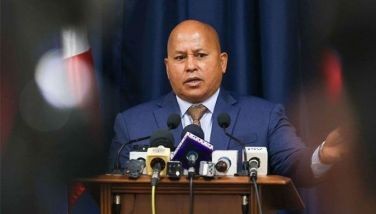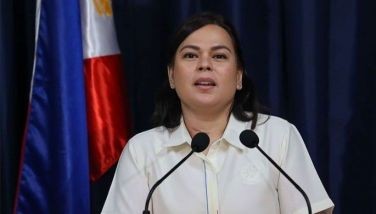CBCP calls for good governance, responsible citizenship
The Catholic Bishops’ Conference of the Philippines (CBCP) yesterday called for good governance and responsible citizenship in the face of several issues plaguing the country, including corruption.
In a pastoral statement issued at the conclusion of their semi-annual plenary assembly in
“We are asking you, our beloved people, to be with us in the moral-spiritual reform of our nation by beginning with ourselves. This is what we need – conversion, real conversion, to put it in terms of our faith, for all of us to deliberately, consciously develop that social conscience that we say we sorely lack and to begin subordinating our private interests to the common good,” the bishops appealed.
“We have always put the blame on people we have chosen to govern us. Today we have become more aware that despite effort, successful or not, to remove the incompetent or corrupt, our problems have remained. We have looked at the enemy as only outside of us,” they lamented.
The CBCP enumerated, in its four-page letter to the clergy and faithful, at least 12 pressing issues currently hounding the country, with the perceived corruption in government on top of the list.
Among the problems cited by the bishops were the unexplained killings of left-leaning militants and journalists, fears on supposedly pending imposition of martial law and Charter change, lack of reforms in the Commission on Elections (Comelec) and the continuing abuse of the country’s natural resources.
The bishops cited as example of an issue that needs resolution the allegation of poll fraud against President Arroyo in the 2004 elections.
Cagayan de Oro Archbishop Antonio Ledesma also revealed that the bishops agreed to allow the issue on the 2004 elections to be resolved by Comelec, especially since they believe its credibility is already being restored with the appointment of former Supreme Court justice Jose Melo as chairman.
The bishops also urged Filipinos to unite and reflect on what actions are necessary for the country to move forward from unresolved political issues.
Bontoc–Lagawe Bishop Emeritus Francisco Claver said the bishops would be conducting dialogues with the faithful in their respective dioceses, especially in rural areas, to help the people assess their concerns and find solutions.
In yesterday’s statement, Catholic bishops also refused to heed calls for them to appeal for the resignation of the President.
Claver argued that calling for the resignation of the President is beyond the functions of the bishops.
“It is the people who should call for resignation. If you can recall EDSA people power in 1986, the Church joined the revolution because the people came first and the will of the people at that time was very obvious. This is what we cannot see in the current situation,” he explained.
Meantime, Malacañang responded to the CBCP statement by calling on all concerned to join hands in addressing the ills named by the bishops but said the problems cannot be blamed on the government alone.
“The bottomline is that we should stop all the fingerpointing and mudslinging. No single individual or group of individuals, including the government or the President, can be blamed but the nation is our collective responsibility,” said Presidential Management Staff chief Cerge Remonde.
“Indeed, in our struggle against these decades-old ills, we must all set aside self-serving agenda to march shoulder to shoulder in the nation’s united effort toward reform and advancement,” added Secretary to the Cabinet Ricardo Saludo.
He pointed out that Mrs. Arroyo instructed the Cabinet last week to deepen consultations and cooperation with the bishops and their congregations to better understand and more effectively address pressing concerns.
Saludo however pointed out some “widely acknowledged and reported developments” that would help put the CBCP statement in “proper context,” including the increased optimism of businessmen and Filipinos in general for the economy, and that the Arroyo administration never resorted to martial law despite successive destabilization attempts.
He said the proposed national ID system as well as Charter change also have supporters and that there are processes and institutions, particularly the legislature, to deliberate such issues democratically. – With Paolo Romero
- Latest
- Trending































